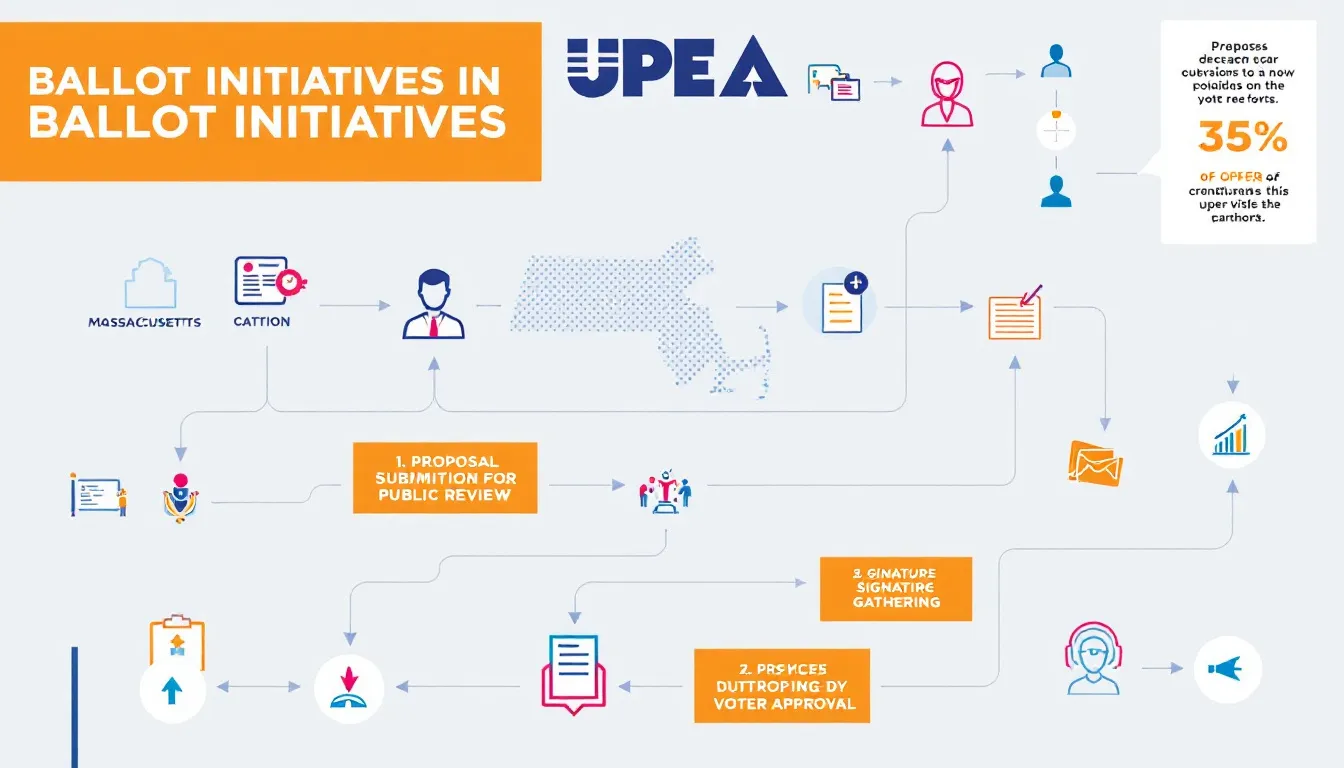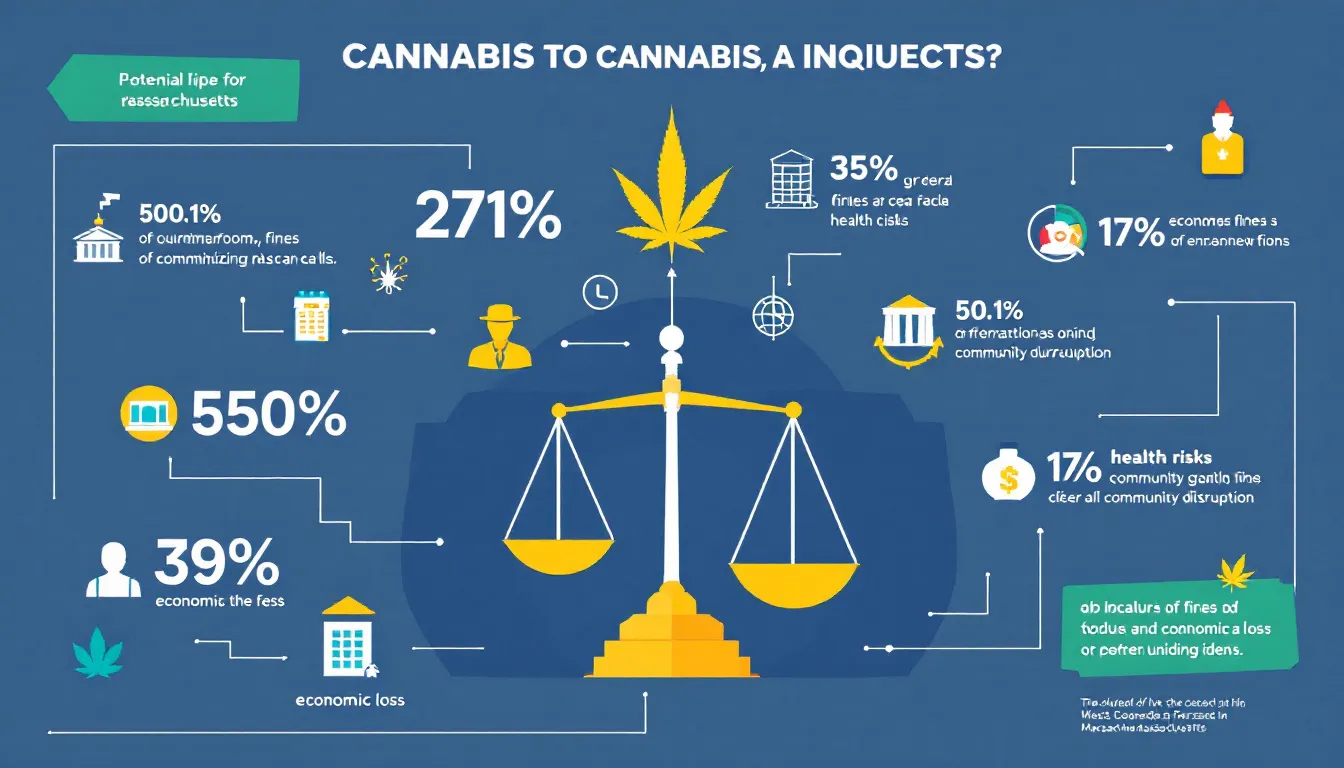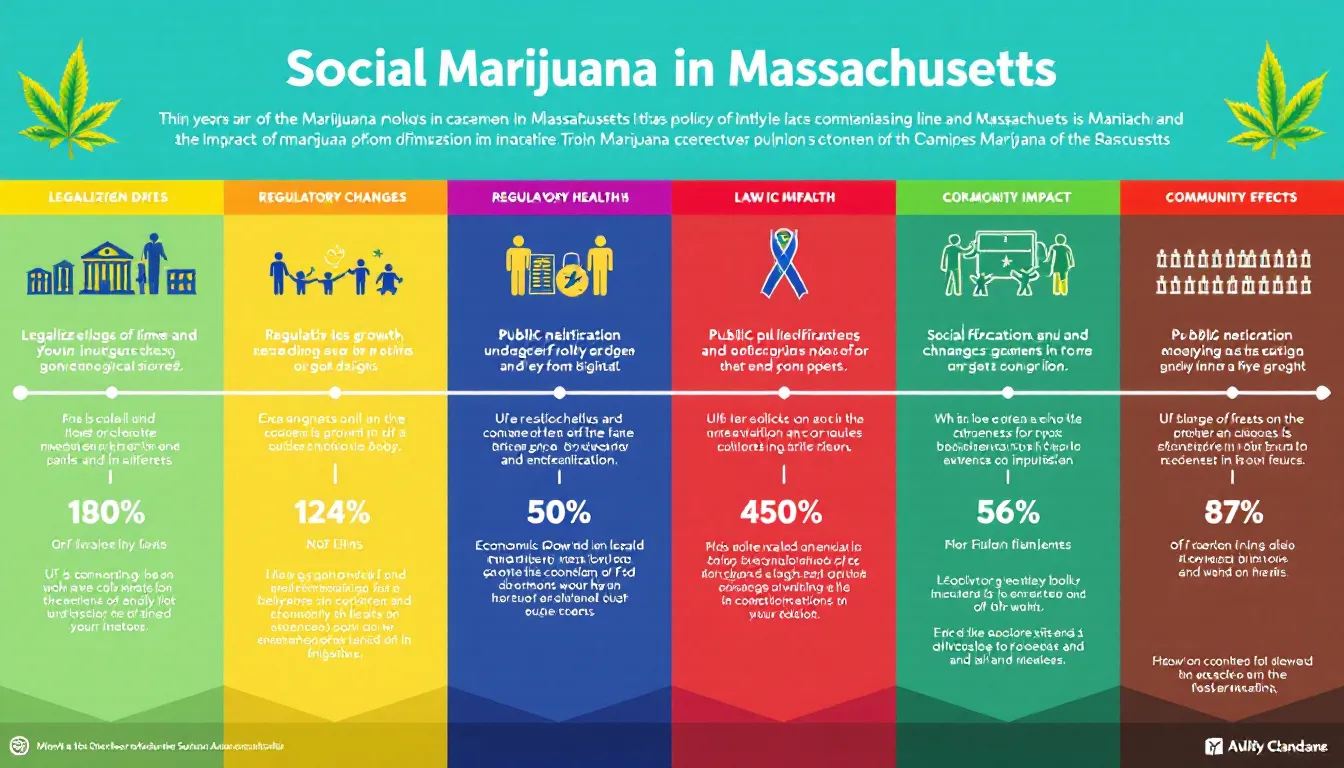The Act to Restore a Sensible Marijuana Policy in Massachusetts is a proposed legislative change that aims to revise the state’s marijuana laws, specifically addressing regulations for adults 21 and older. It seeks to introduce stricter regulations on possession, cultivation, and sale of recreational marijuana while ensuring access to medical cannabis. This act, known as “what is an act to restore a sensible marijuana policy in massachusetts and why could it end up on a ballot,” could end up on a ballot because voter approval is required for such significant legal changes. In Massachusetts, the attorney general is responsible for reviewing and certifying ballot initiatives before they proceed in the state’s election process. The article will explore the details of the act, the process to get it on the ballot, and its potential impacts on Massachusetts residents.
Key Takeaways
- The ‘Act to Restore a Sensible Marijuana Policy’ proposes significant changes to cannabis laws in Massachusetts, including limits on possession and the elimination of the commercial adult-use market.
- The initiative requires gathering over 74,000 signatures by December 3, 2025, followed by an additional 12,429 if not enacted by the Legislature, to qualify for the November 2026 ballot.
- Public opinion shows strong support for cannabis legalization, with 80% of voters favoring it, influencing the legislative process and potential outcome of the proposed act.
Understanding the Act to Restore a Sensible Marijuana Policy

The “Act to Restore a Sensible Marijuana Policy” represents a significant shift in the regulatory landscape of cannabis in Massachusetts. This act aims to address the current marijuana framework by introducing a new regulatory approach that balances public health and safety with fiscal responsibility. The act proposes to establish new limits on possession, cultivation, and sales of recreational marijuana, while also ensuring adequate access to medical marijuana for patients.
One of the primary goals of the act is to create a sensible marijuana policy that emphasizes safety, health, and social equity. The act aims to balance marijuana regulation, addressing concerns from both public health advocates and the cannabis industry. Additionally, the act addresses use distribution and the taxation of recreational marijuana by proposing changes to how these areas are regulated under Massachusetts law.
Key Provisions of the Act
The Act to Restore a Sensible Marijuana Policy includes several key provisions that would significantly alter the current cannabis laws regarding marijuana in Massachusetts:
- Adults could possess up to one ounce of marijuana.
- This includes a maximum of five grams in concentrate form.
- Possession exceeding one ounce but under two ounces would incur a civil penalty of $100.
These limits aim to regulate personal use while discouraging excessive possession and cannot measure for less misuse, ounce but less potency limitations over the years. To pass these limits would still lead to consequences of a sale.
Another major provision involves the restriction on home cultivation of cannabis. Under the new act, adults would lose the right to cultivate cannabis in their homes. This change reflects a shift towards more controlled and regulated cannabis production, potentially reducing the risks associated with home grows.
Comparison with Current Laws
Currently, Massachusetts allows for a commercial adult-use market, where individuals can legally purchase cannabis from licensed dispensaries. The proposed act aims to eliminate this commercial market, significantly changing the existing marijuana sales laws in the state. The act would repeal existing provisions that allow for commercial sales and broader possession limits. This move would mark a substantial rollback of the current legalization framework, impacting both consumers and businesses.
Additionally, the new act introduces more stringent possession and cultivation limits compared to current laws. While the current laws permit home cultivation and higher possession limits, the proposed changes would impose stricter controls. These differences highlight the act’s intention to create a more regulated and controlled environment for marijuana use.
The Process for Ballot Initiatives in Massachusetts

The journey of the “Act to Restore a Sensible Marijuana Policy” to the ballot involves a series of procedural steps that must be meticulously followed:
- Filing of petitions with the Attorney General’s office. Ballot initiative petitions are submitted for review and certification as part of this process.
- The Attorney General’s office reviews initiative petitions to ensure they comply with constitutional standards. Attorney General Andrea Joy Campbell is responsible for certifying these petitions.
- If compliant, the petitions can be filed with the Secretary of the Commonwealth.
This initial review is crucial as it determines whether the proposed initiative can proceed to the end next stage.
Ballot initiatives in Massachusetts can propose state statutes or constitutional amendments based on voter signatures. This means that if enough registered voters support the proposal, it can advance towards becoming a law, reflecting the democratic nature of the process. In the most recent cycle, 47 ballot initiatives were filed for review in Massachusetts.
The role of the Attorney General’s office is pivotal in this process, ensuring that all proposals meet the necessary legal standards.
Signature Collection Requirements
To successfully file a petition initially, proponents must:
- Gather the signatures of 74,574 registered voters by the December 3 deadline.
- This figure represents 3% of the votes from the last gubernatorial election.
- Demonstrate significant public support needed to advance an initiative.
This initial phase is critical as it demonstrates the level of public backing for the proposed change.
If the Legislature does not enact the proposed initiative, an additional 12,429 signatures are necessary for it to be considered on the ballot. The second round of signature collection ensures sustained public support, maintaining momentum towards the ballot.
Certification by Attorney General’s Office
The Attorney General’s office plays a critical role in certifying ballot initiatives, ensuring compliance with legal standards. The office will announce petition certification approval on September 3. This certification process is essential as it validates the initiative’s adherence to constitutional requirements, allowing it to proceed.
For the petitions to move forward, sponsors must collect over 74,000 valid signatures for each petition and may need to gather an additional 12,000 if not approved by the state legislature. This rigorous process underscores the importance of widespread public support and legal compliance in advancing a ballot initiative.
Legislative Approval and Voter Decision
The initiative petition needs legislative approval after certification. If the Legislature remains inactive, an additional 12,429 signatures are required to place the initiative on the ballot. This step ensures that the proposal has sufficient backing to warrant a place on the ballot, reinforcing the democratic process.
The final deadline for gathering signatures to place the initiative on the ballot is July 1, 2026. After meeting all requirements, Massachusetts voters will decide on the initiative in the November 2026 election. This final step reflects the power of the electorate in shaping state laws through direct democracy.
Public Opinion and Support
Public opinion and support play a crucial role in the success of any ballot initiative. Advocacy organizations, such as MassCann, are instrumental in influencing public sentiment and legislative changes regarding cannabis legalization. These organizations mobilize community support or opposition, significantly shaping public perspectives on marijuana policy.
Recent polls show strong support for cannabis legalization among Massachusetts voters. Advocacy groups on both sides of the debate continue to play a significant role in shaping public opinion and policy decisions related to marijuana legislation.
These groups’ ongoing discussions and mobilizations will be crucial in determining the proposed Act’s outcome.
Recent Polls and Surveys
Surveys reveal that a significant majority of Massachusetts voters support cannabis legalization. In July 2023, 80% of state voters favored legalizing cannabis. This strong support reflects a growing acceptance of both recreational and medicinal marijuana use among the electorate.
The data from Civiqs in July 2023 confirms this trend, with 80% of Massachusetts residents supporting the legality of cannabis. These findings highlight strong public backing for cannabis legalization, a critical factor in the upcoming ballot initiative.
Key Stakeholders and Advocacy Groups
Key stakeholders, including advocacy groups and community organizations, play a significant role in the debate over cannabis policy. Recriminalization could exacerbate issues related to social justice, disproportionately affecting marginalized communities that have been historically targeted by cannabis laws. Advocacy groups highlight these concerns, emphasizing the need for equitable marijuana policies.
Recriminalization supporters argue that changing marijuana policies can improve regulatory control. The ongoing debates from advocacy groups on both sides significantly shape public perception and policy related to cannabis in Massachusetts.
Potential Impacts of Recriminalizing Cannabis

Recriminalizing cannabis in Massachusetts could have far-reaching economic, legal, and social impacts. The proposed legislation seeks to roll back adult-use marijuana legalization significantly while maintaining medical marijuana access and could lead to a repeal of certain provisions. This dual approach could create a complex regulatory environment affecting various stakeholders.
The economic impact of recriminalization could be substantial. The cannabis industry has significantly boosted job creation and generated over $1 billion in sales by 2022. Reversing legalization could negatively affect local economies, as cannabis businesses contribute significantly to community funding through taxes and employment.
Economic Impact
The cannabis industry in Massachusetts has been a significant driver of job creation, providing diverse employment opportunities from cultivation to retail. Recriminalizing cannabis could reverse this trend, leading to job losses and negatively impacting ancillary businesses such as packaging and marketing.
The cannabis sector generated over $200 million in tax revenue in 2022. Recriminalization may reduce this revenue, affecting local economies and community funding. These economic considerations are crucial in the debate over the proposed Act.
Legal and Social Implications
The proposed Act would impose new restrictions on medical marijuana, capping THC levels in products. This change could impact patients who rely on higher THC levels for adequate relief. Additionally, the Act aims to address public health concerns, but it may also lead to increased enforcement efforts and legal challenges.
Socially, the recriminalization of cannabis could exacerbate existing inequities. Communities historically targeted by drug enforcement policies may face increased scrutiny and penalties under the new law. It is crucial to address these social implications to develop a fair and effective marijuana policy.
The Role of the Cannabis Control Commission

The Cannabis Control Commission is responsible for regulating the cannabis industry in Massachusetts, including licensing dispensaries and overseeing compliance with laws. The Commission ensures that the recreational and medical cannabis markets operate fairly and safely for consumers and businesses.
If passed, the Act to Restore a Sensible Marijuana Policy might change the Cannabis Control Commission’s oversight responsibilities, potentially affecting its regulatory framework. These changes could influence how the Commission manages the cannabis market and enforces new regulations.
Controversies and Challenges
The Cannabis Control Commission has faced its share of controversies and challenges, particularly regarding the pace at which it issues licenses. Many potential business owners have expressed frustration with the slow process, which has hindered their ability to enter the market. This slow pace has led to numerous complaints and has become a significant point of criticism for the Commission.
The Commission must address these issues to manage future cannabis policy changes and potential legislative shifts effectively. Improving the speed and efficiency of the licensing process is essential to restoring trust among stakeholders and ensuring the successful regulation of the cannabis market.
Reform Proposals
Recent reform proposals aim to enhance the effectiveness of the Cannabis Control Commission. Suggestions include increasing transparency in its operations and improving financial reporting practices. These reforms aim to address the Commission’s criticisms and challenges and ensure better regulatory oversight.
Other proposals involve reducing the Commission from five to three members and altering the ownership definition to allow more flexibility for cannabis investors. These changes could streamline decision-making processes and encourage investment in the cannabis industry, contributing to its growth and stability.
Public Health Concerns
The proposed ballot initiatives to repeal recreational marijuana sales in Massachusetts have sparked a renewed debate over public health. According to the Massachusetts Department of Public Health, the legalization of recreational marijuana has coincided with an uptick in emergency room visits and hospitalizations linked to marijuana use. Supporters of the initiatives argue that restoring a sensible marijuana policy—by limiting access to recreational marijuana and tightening regulations—could help address these growing concerns.
Advocates for the proposed measures believe that stricter controls on marijuana sales and use may reduce the prevalence of marijuana-related health incidents. By placing the question on the ballot, Massachusetts voters will have the opportunity to weigh in on whether a rollback of current marijuana laws could lead to improved public health outcomes. The debate centers on whether these ballot initiatives, designed to restore a sensible marijuana policy, may help mitigate the unintended consequences of legalization while still allowing for responsible use.
Potential Effects on Health Outcomes
The potential health effects of the proposed ballot initiatives are complex and multifaceted. On one hand, reducing access to recreational marijuana could lead to a decline in health issues such as increased heart rate, memory impairment, and episodes of psychosis—problems that have been reported more frequently since legalization. The Massachusetts Cannabis Control Commission has noted that many marijuana-related health incidents are associated with high-THC products, which would face stricter regulation under the proposed initiatives.
However, some public health experts caution that limiting legal access to recreational marijuana may inadvertently drive consumers to the illicit market. Black market products often lack quality control, may be more potent, and can be contaminated, potentially resulting in even greater health risks. As Massachusetts considers these ballot initiatives, the challenge will be to balance the benefits of tighter control with the risks of unintended consequences, especially as the state seeks to maintain a sensible marijuana policy that protects public health.
Substance Use and Prevention
The impact of the ballot initiatives on substance use and prevention efforts in Massachusetts is another key consideration. By restricting access to recreational marijuana, proponents hope to reduce youth exposure and prevent the development of marijuana use disorder. Limiting the availability of recreational marijuana may also support broader substance use prevention strategies, aligning with the goal to restore a sensible marijuana policy.
However, there are concerns about how these changes could affect patients who rely on medical marijuana. While the Attorney General’s office has clarified that the initiatives would still allow for medical marijuana use, the specifics of implementation remain uncertain. Caroline Cunningham, the lead proponent of the initiatives, emphasizes that the intention is to prioritize public health and safety while ensuring that those with legitimate medical needs would still have access. As Massachusetts voters consider these ballot initiatives, the balance between prevention, access, and public health will be at the forefront of the policy debate.
Community Impact
The proposed ballot initiatives to repeal recreational marijuana sales could have significant effects on communities across Massachusetts, especially in areas where dispensaries have become part of the local economy. If the initiatives pass, the laws allowing for recreational marijuana sales would be repealed, potentially leading to the closure of dispensaries and the loss of jobs and tax revenue that many towns and cities have come to rely on.
For communities that have benefited from marijuana sales, the proposed changes may result in budget shortfalls and reduced funding for public services. The closure of dispensaries could also leave vacant storefronts, impacting local business districts and economic activity. However, supporters of the initiatives argue that repealing recreational marijuana sales could bring benefits such as reduced crime and enhanced public safety, aligning with the goal to restore a sensible marijuana policy.
Effects on Local Communities
The effects of these ballot initiatives on local communities would be wide-ranging. The loss of revenue from recreational marijuana sales could force municipalities to make difficult decisions about public services, potentially leading to cuts in areas like education, infrastructure, or public safety. Additionally, the closure of dispensaries may contribute to economic decline in some neighborhoods, as these businesses often serve as anchors for local commerce.
On the other hand, some residents and officials believe that repealing recreational marijuana sales could improve quality of life by reducing crime and addressing concerns about public health and safety. The Massachusetts Attorney General’s office has stated that the initiatives are intended to restore a sensible marijuana policy that puts community well-being first. Ultimately, the 2026 ballot will give Massachusetts voters the power to decide whether to continue with the current approach to marijuana sales or to pursue a new direction that prioritizes both public health and community safety.
Timeline and Next Steps

The timeline for the “Act to Restore a Sensible Marijuana Policy” to reach the ballot includes several critical milestones. The first major step is the collection of signatures, with the initial round due by December 3, 2025. If the state legislature does not enact the proposed law, a second round of signatures must be submitted by July 8, 2026.
Meeting these deadlines is crucial for the initiative to qualify for the November 2026 ballot. Proponents and opponents of the initiative must engage in effective campaign strategies to mobilize voter support and ensure a successful outcome. Grassroots campaigns and public education efforts will be crucial in shaping Massachusetts voters’ final decision.
Petition Deadlines
To qualify for the ballot, each initiative must gather over 74,000 valid signatures from Massachusetts voters. The initial round of signatures must be submitted by December 3, 2025, to ensure sufficient public support to advance. This step is crucial to demonstrating the initiative’s viability and gaining momentum.
If the Legislature does not act on the proposed law, a second round of signatures is required by July 8, 2026, a year after the initial proposal. This additional phase ensures sustained public backing, reinforcing the democratic process, and allowing the initiative to move forward to the ballot.
Campaign Strategies
Supporters of the cannabis initiative are expected to focus on grassroots campaigns to mobilize voters. These efforts will likely involve public education campaigns, community outreach, and leveraging social media to raise awareness about the proposed Act’s benefits. Building a strong coalition of supporters will be key to securing the necessary votes.
Opponents of the initiative may leverage concerns about public safety and regulatory issues in their campaigns. They will likely emphasize the potential risks associated with changes to marijuana policy, aiming to sway public opinion against the proposal. The outcome of these campaigns will play a significant role in the final decision by Massachusetts voters in the November 2026 election.
Summary
The “Act to Restore a Sensible Marijuana Policy” represents a significant potential shift in the regulation of marijuana in Massachusetts. By introducing stricter possession limits, eliminating the commercial adult-use market, and regulating medical marijuana, the Act aims to create a more controlled and balanced approach to cannabis policy. This proposed change has sparked a wide-ranging debate involving public opinion, economic impacts, and social implications.
As we approach the November 2026 ballot, the role of advocacy organizations, the Cannabis Control Commission, and public campaigns will be critical in shaping the outcome. The rigorous process for qualifying the initiative, including signature collection and certification, underscores the importance of democratic participation. Ultimately, the decision lies with Massachusetts voters, who will determine the future of marijuana policy in the state.
FAQs
What is the "Act to Restore a Sensible Marijuana Policy"?
The "Act to Restore a Sensible Marijuana Policy" is proposed legislation designed to revise Massachusetts' marijuana regulations, emphasizing public health, safety, and fiscal responsibility. This initiative seeks to create a more effective approach to marijuana policy in the state.
What are the key provisions of the Act?
The key provisions of the Act establish new limits on the possession and cultivation of recreational marijuana, eliminate the commercial adult-use market, and regulate medical marijuana to ensure adequate access for patients.
How does the ballot initiative process work in Massachusetts?
The ballot initiative process in Massachusetts requires proponents to file petitions with the Attorney General’s office, gather a specified number of signatures from registered voters, and secure certification before their initiative can appear on the ballot. This structured procedure ensures that only measures with adequate public support are considered.
What impact could recriminalizing cannabis have on the economy?
Recriminalizing cannabis could adversely impact job creation and tax revenue, hindering local economies that benefit significantly from the cannabis industry. This shift may reverse economic gains and lead to a decline in overall financial growth.
What role does the Cannabis Control Commission play in this process?
The Cannabis Control Commission plays a pivotal role in regulating the cannabis industry by overseeing the licensing of dispensaries and ensuring compliance with relevant laws. Its responsibilities may evolve with potential changes in marijuana policy.





